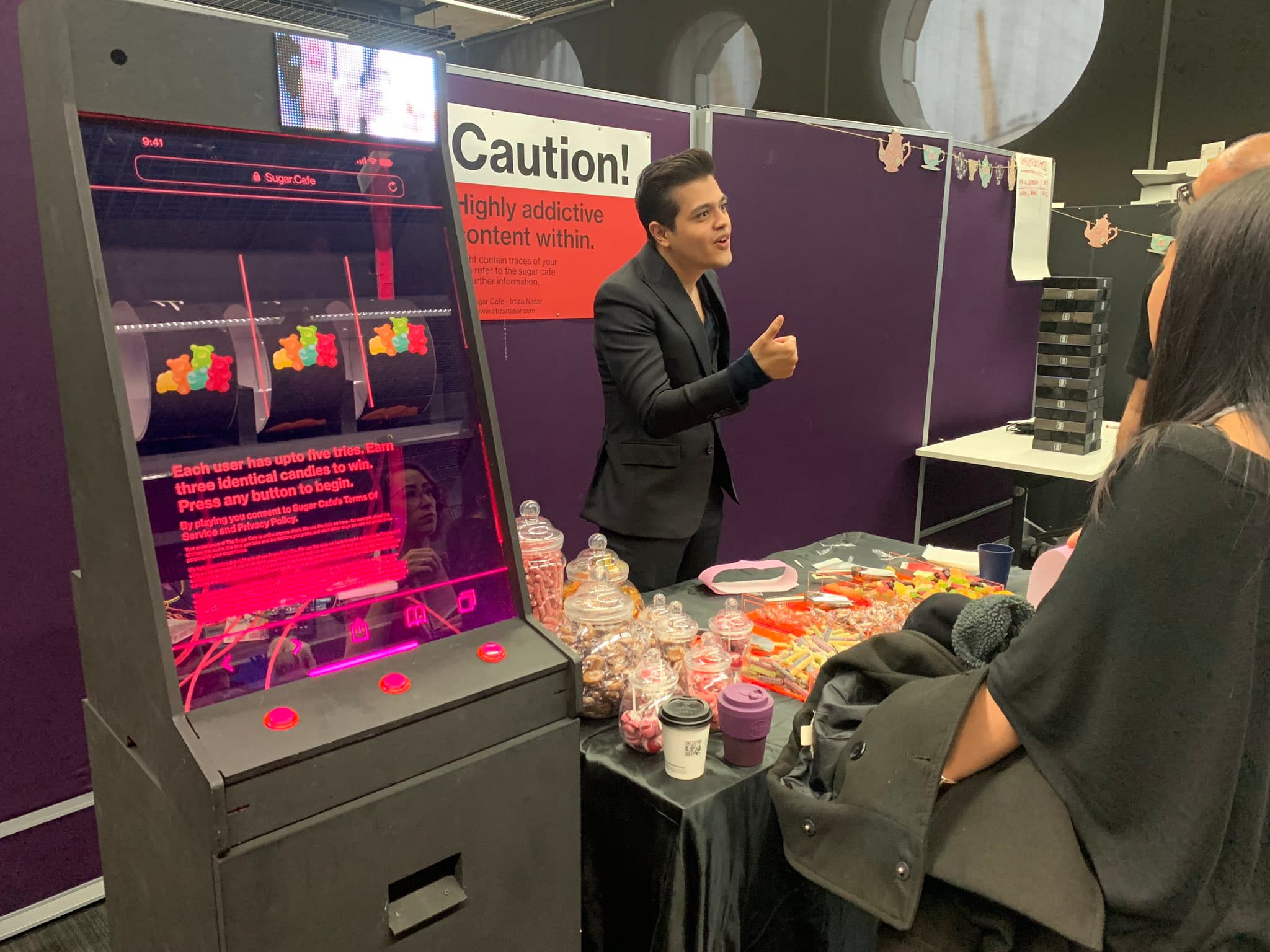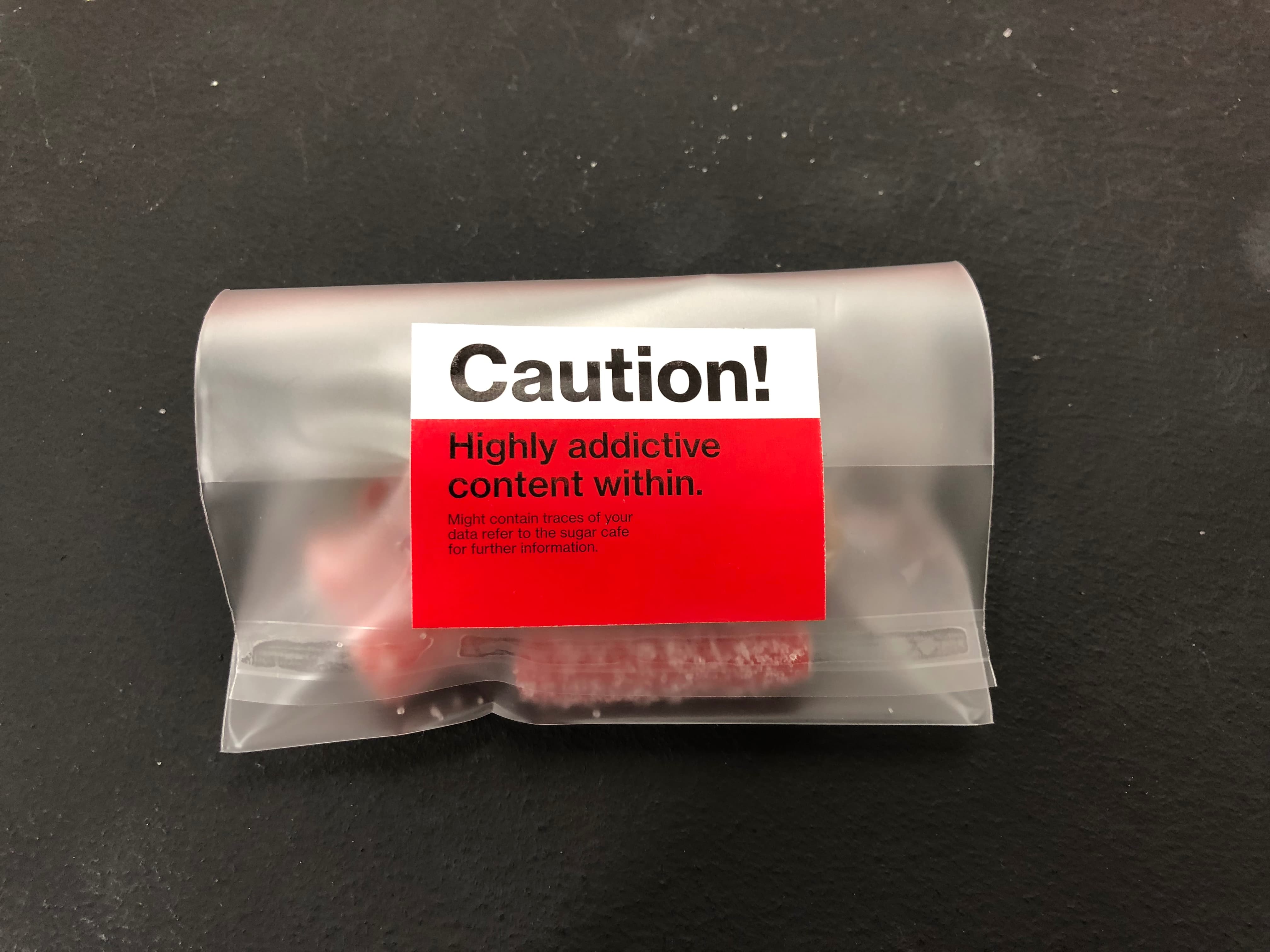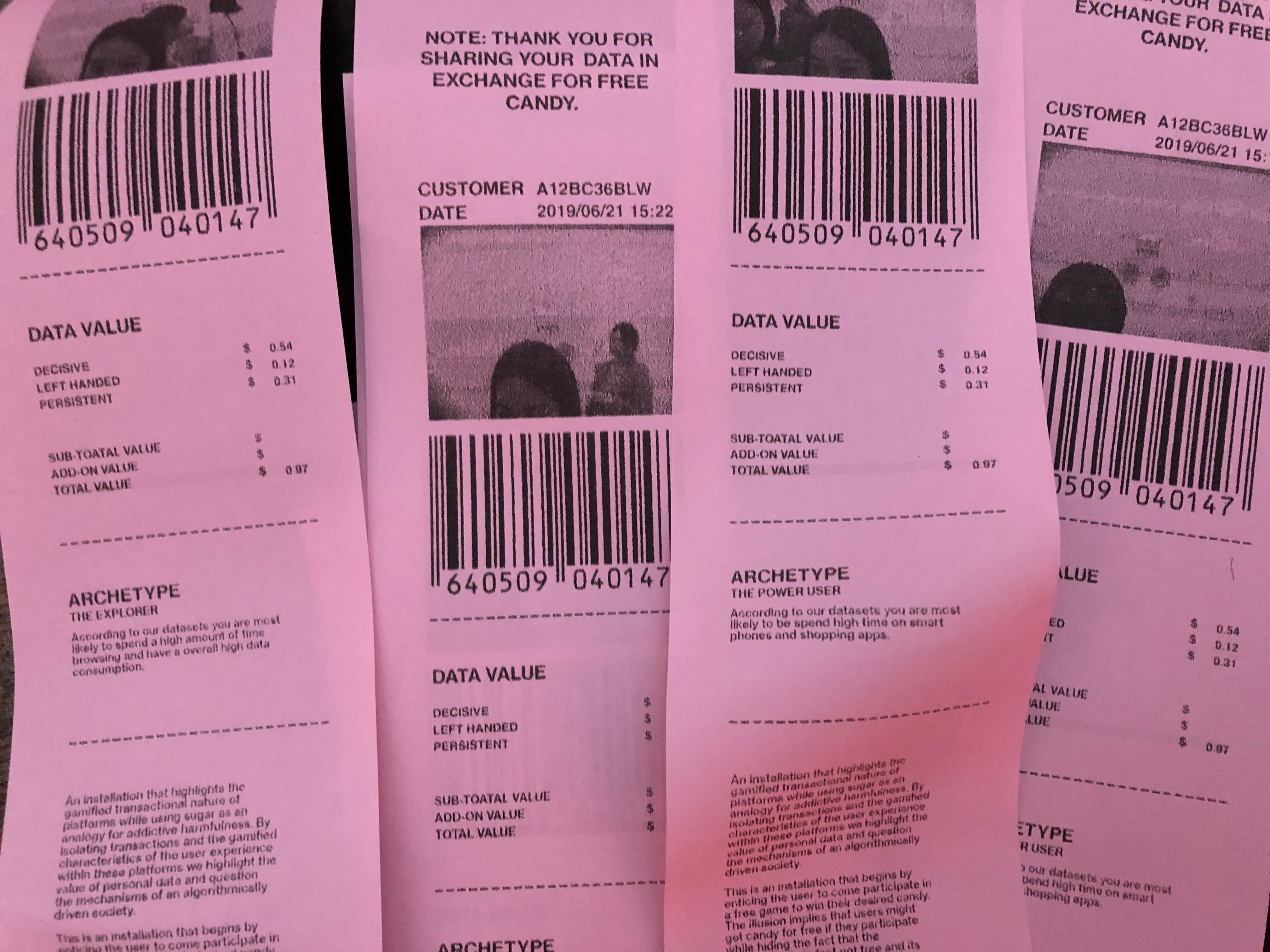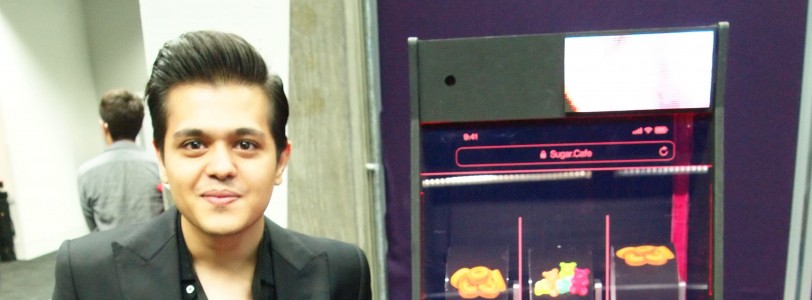Could you first introduce yourself to the reader?
My name is Irtiza Nasar, and I’m an artist, designer and researcher. My work currently explores the politics of upcoming technologies and questioning the mechanisms of an algorithmically driven society.
What does a typical day look like for you?
As a rule my day begins with 10 successive alarms; a necessary regimen to ensure I’m up. This is followed by a cold shower and a homemade Americano (read: self induced caffeine shock) before I’m out the door. The rest of the day varies according to what is on my calendar. Some days are spent navigating London’s underground from point A to point B in a bid to make it from one meeting to the next. Others are spent in my studio working on projects I’ve taken up. I usually finish at night which is when I pick up a quick bite from one of seven designated eateries and make my way home.
What’s great about what you do?
What I love about my work is how interdisciplinary it is. It is difficult to put it into one neat little box and assign a category to it. I might finish up a healthcare related project on Monday and move on to one regarding social media on Tuesday. The stratosphere that I navigate is ever evolving which is essential for someone as restless as myself. In addition to this I constantly strive to take up projects that make a difference in the world we live in. This spirit of social change has helped shape my work significantly in the last few years.
A noble goal! But are there bits you don’t like or find challenging?
Despite the widespread application of technological advances, the general population's understanding about possible adverse outcomes to those advances remains abysmal. A big part of my work is to help bridge this gap between consumers and providers. While I’ve managed to make progress with the academic aspect of this subject, I am still trying to figure out the best way to practically disseminate this information in a way that is accessible to all.
Where did your interest in technology and data come from? What is your earliest memory of engaging with the mediums?
Not my earliest memory but one that stands out would be when I hacked into my school's network in the fifth grade and exposed a major security flaw which would’ve allowed anyone with the right tools to gain access to confidential materials such as test papers and reports. It helped the school build a more secure network to avoid the possibility of something like this happening again. I also have a distinct memory from my childhood where I became exceedingly fascinated by my mother’s MAC compact because I thought it had something to do with Apple.
I’ve been so inclined for as long as I can remember. Back in school, while other kids spent their free time playing video games, I was a lot more fascinated by what was going on behind the screen. I would spend a good part of my free time taking things apart and trying to put them together again. As I grew older this fixation harboured into a more academic interest. I began to understand the intricate systems in place for the functioning of day to day items. Whether it was the smart-fridge in the kitchen or the phone in my dad’s hand, I would spend time learning about the science behind them.
This was also when I began to understand the role design played in modulating the average user’s experience with all these objects.
Nothing was random about the way they operated. Even seemingly trivial details were formulated based on research done into what would resonate best with the target demographic. These devices were self-sufficient in this regard as they were able to produce mass amounts of data which was constantly being analysed and used to run feedback loops dictating their functioning. In turn this contributes to this facade of these machines acquiring autonomy.
Do you think that technology is a net good for society?
Evolution and progress is something that can never be halted and neither should it be. Technology aids this process and hence is net good for society. Everything has its positive and negative impacts. What's important is the fact that with the introduction of new tech the society must also evolve to keep up to mitigate its negative impacts.
An example of this, among many things, is the fact that in accordance with the introduction of modern technologies, law also needs to evolve in the shape of modern legislation. This is to ensure some ground rules are followed by tech conglomerates and adequate measures are taken up in regards to ensuring digital literacy for the citizens of the society being exposed to these upcoming technologies.
And are you more optimistic or pessimistic about the current direction of technology in society, and why?
I guess the way I’d put this is I’m optimistic for the future of technology but pessimistic about the current direction it’s being deployed. There is a need for legislation to intervene and ensure an ethical framework or an operation manual is laid out for the role of upcoming technologies. There is also a need for a higher transparency in regards to the limitation of these technologies to better understand to what extent they might be accurate, or what biases they might contain within them.
We first met at the Mozilla Festival in 2019. Was it your first time, and how did you find it?
I started off my journey with Mozilla in 2018 as a volunteer and fell in love with the community of diverse individuals coming together from a wide variety of backgrounds with a common goal of creating a better, healthier internet. It was an overwhelming experience to transition into one of the exhibitor/facilitator this past year, in 2019. It allowed me to disseminate my research to a wide variety of people. Furthermore this allowed me the opportunity to have discussions with many academics and professionals regarding the politics of upcoming technologies.
At MozFest you were showcasing the Sugar Cafe. Can you tell us a bit about the installation?
The Sugar Café is an installation that highlights the gamified transactional nature of platforms while using sugar as an analogy for addictive harmfulness. By isolating transactions and the gamified characteristics of the user experience within these platforms it highlights the value of personal data and questions the mechanisms of an algorithmically driven society.
This is an installation that begins by enticing the user to come participate in a free game to win their desired candy. The illusion implies that users might get candy for free if they participate while hiding the fact that the transaction is in fact not free and it’s their data that they’re paying with.
The candy machine has been designed for discrete data collection without alerting the user and clearly mentions its mechanisms within its terms and conditions which the users accept when they begin to use the machine. This mimics the same unethical practices of a multitude of online social media platforms.
Algorithms are like black boxes ─ it's never revealed to the user as to how they work and what data they use. They're used to process the data collected for users and make determinations about them. The problem with these black box algorithms is that they have to be trained on a set of data but, as proprietary software, it's hard to tell what data they've been trained on. The data set might have been biased towards or against one gender or race leading to further bias or inaccurate outcomes. The data collected by the Sugar Cafe is processed through an algorithm to determine the best mix of candy for the user's personality according to our datasets ─ they may never receive the candy they earned in the game.
Newsfeeds, sometimes also referred to as the stalker's delight or a lurker’s guilty pleasure, are a major aspect of these platforms. The newsfeed is personalized for the users based on the data sets on them and what the algorithm thinks the user might like. It's gamified like a slot machine so it plays on the mechanism of rewards. Not everything seen is what the user wants, and they have to scroll down and make an effort. The reward in return would be finding something that interests you which leaves the user wanting more. Hence the Sugar Café employs the use of candy bags as a representation of newsfeeds, the bags contain a personalized mix of candy based on what the algorithm thinks you'll like ─ you have to eat your way through the mix to find the ones you like the same way as we scroll through are social media feeds to find the content we might like.
How did you first find out about these ad trackers?
The first time I was introduced to the world of ad trackers was when I was being exposed to advertisements that seemed targeted and not random. As always I started unpacking and researching the mechanisms behind it to better understand how the digital advertising ecosystem was functioning. This is when I actually stumbled upon the grand scheme of the advertising industry in regards to targeting users and all the unethical practices that go behind to make that happen. This further led me down to looking into subjects like data and data brokers.
Why did you introduce the gamification elements to the installation?
Gamification techniques are employed by social media platforms to create addictive user experiences. The inspiration for the introduction of the gamification elements was due the popularity of newsfeeds across social media platforms and how they themselves mimic slot machines with reward based behaviour.
My project, The Sugar Café, employed candy bags as a representation of this. Each bag contained a mix of candies based on what the algorithm assumed the user may like. The user would, in turn, have to eat their way through the mix to find the ones they actually liked. The use of transparent bags was a play on the fact that these newsfeeds are designed to appear quite transparent on a superficial level but in actuality contain personalized content that has been weaponized or carefully handpicked by algorithmics to cause addiction.

What have some of the responses been to Sugar Cafe?
The general response was overwhelmingly positive with many attendees praising the socially conscious nature of the project. I was invited to display the project at the Mayor of London’s Digital Careers Fair in 2019 where I was able to educate the upcoming youth regarding the politics of upcoming technologies and more specifically about the weaponization of their personal data on a daily basis. I was also invited to display the project at MozFest 2019 where I was able to disseminate my research across a wider audience and discuss my ideas with many professionals from the industry.
And is there a particular ‘outcome’ you want to get from it?
As with anything I work on, I hope to see it make a difference in the community. The idea behind the sugar cafe was to put a mirror to society and help people understand the elusive nature of commonly used digital platforms. At the very least I hope it can serve to raise some degree of awareness about how deceptive these platforms and services can often be and help us derive solutions to these issues.
How can people better look after their data online?
The most important thing is to stay educated. I can bet my life on the fact that no one reading this has ever put in the effort to go through the terms and conditions page that pops up when you access a website or agree to use a service. And I don’t blame them. These documents are purposely designed this way. Unfortunately buried deep within them are clauses that allow these platforms to procure and use an individual’s data without ever breaking the law. The only way around this is to keep oneself as well informed as possible about this ‘dark side’ of technology. Questioning everything is the key as nothing is ever free. A fellow at one of my exhibits framed this beautifully by saying if there’s nothing on the menu then it's probably you, which is a very nice lens to frame this in. It refers to the fact that with the introduction of these free services we are the real commodities that are being traded upon.
What are the highlights of your career to date?
I’d say the transition from being an attendee at MozFest to one of the presenters was a big highlight as it allowed me to interact with many academics and expand my scholastic horizons. In addition Pei Chin Tai at the Mayor Of London's office believing in the importance of this work and inviting me to exhibit at the Mayor's Digital Careers event was also an invaluable opportunity where I was able to interact with many young individuals.
Can you describe your biggest challenge so far in your career? How did you overcome it?
A lot of my work is centered around bridging the gap that exists between the average man’s understanding of technological advancements and the platforms that provide them. Having studied all this from an academic perspective it is often a struggle to find the best way to disseminate this information to the audience without making them feel bogged down by technical specifics. In addition, a common adage that I’ve experienced during my time in this field has been people underestimating the gravity of these findings by assuming that their data isn’t important enough for conglomerates to steal. In reality, this industry pries on the unsuspecting user, utilizing their information as currency.
I have found that the only way to overcome this is by displaying my projects to a wide variety of individuals and using their feedback to customize how I give out this information. The audience’s suggestions have been invaluable in terms of refining my methods and getting my message across to a variety of communities.

To quote an example from my own experience, the layout for The Sugar Café was changed numerous times. Each iteration took into account feedback from various audiences and used it to create an experience that would resonate with everyone. This was also the reasoning behind using candy as a metaphor for the instant gratification that these platforms provide. Instead of attempting to explain this in ambiguous jargon I deployed the use of something that everyone in the audience was familiar with.
Have you noticed any changes in the industry? If so, what?
The industry has seen a shift in regards to data literacy, and a lot of new startups are popping up to offering solutions to take back control of your data, and selling it yourselves to generate revenue as individuals rather than aiding the business models of tech gains. While these startups are good as they raise importance regarding the bigger issue which is making people realize how important their data is, at the same time they are still driven by the capitalistic business value of the society which fail to acknowledge some of the deeper ethical implications of how an individuals data being out their might negatively impact them.
You’ve been granted the ability to send a message to 16-year-old you. What do you say?
I think the message I’d like to emphasise upon for the upcoming generation is “Your consent starts only when you understand.” What I mean by this statement is the fact that real consent isn’t when you agree to the terms of conditions of a service or a product by checking a tick box or clicking a button, it is actually when you understand what those terms and conditions mean and how they might affect you. That is the point when you’re in a position to better understand what the trade-off is for using the service, and evaluate if it's worth whatever you’re getting in return.
I understand that no one wants to read those long terms and conditions filled with legal jargon you might not understand, and the reason behind that is that they’ve been purposefully designed to evoke such feelings. But please research the services before you sign up to better understand their business models, question everything ─ a lot of experts might have simplified those terms in simple brief words for you to understand to better safeguard your rights.
Please think wisely about what you put out and question what it could say about you as a person, or what can be inferred about you from that piece of information in correlation with all the other things you have posted.
Some of these data points will come back to haunt you in life so it’s important to evaluate them now. Also it’s okay that you don’t want to do the same thing as everyone else, for example sign up to a social media network or have accurate life details on it. It seems scary right now to delve into uncharted territory but it is all going to work out in the end. You’ll make sure of it.
Do you have any advice for young people interested in doing your kind of job?
The only thing I can say is from my own experience. There have been days when I have been tested beyond what I thought was my breaking point and the only thing that keeps me going on those days is the passion I have for my work. There is no easy way to do this and the only way to put in a 100% every day is to find something that constantly inspires you. The other thing I can add to this is try to surround yourself with individuals that inspire you on a daily basis and make you thrive to create work that changes the world for better. I’ve been very lucky in regards to this to have found mentors such as Tobias Revell, Ian Hague, Oliver Smith, Gareth Foote and John Fass who’ve helped shape me and my practice into everything that it is today and they continue to be a constant source of guidance.









0 Comments